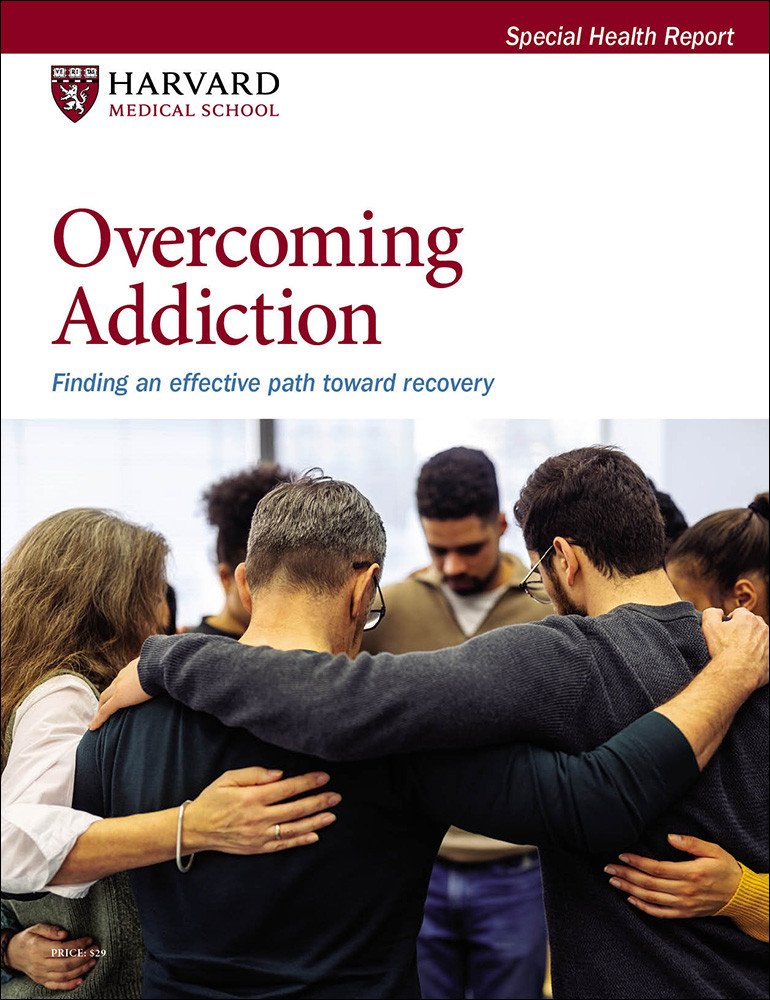
5 timeless habits for better health

What are the symptoms of prostate cancer?

Is your breakfast cereal healthy?

When pain signals an emergency: Symptoms you should never ignore

Does exercise give you energy?

Acupuncture for pain relief: How it works and what to expect

How to avoid jet lag: Tips for staying alert when you travel

Biofeedback therapy: How it works and how it can help relieve pain

Best vitamins and minerals for energy

Should you take probiotics with antibiotics?


Overcoming Addiction: Finding an effective path toward recovery
Addiction can be devastating. Recent scientific advances have shaped our understanding of this common and complex problem. The good news is that there are a number of effective treatments for addiction, including self-help strategies, psychotherapy, medications, and rehabilitation programs. You can use the strategies presented in this report, Overcoming Addiction: Finding an effective path toward recovery, to discover new ways to cope with life’s difficulties.
Other Product Information
Addiction can be devastating. One of the most common expressions of addiction, alcohol dependence, causes an estimated 100,000 deaths annually — the equivalent of an airliner carrying 274 passengers crashing every single day. The good news is that there are a number of effective treatments for addiction, including self-help strategies, psychotherapy, medications, and rehabilitation programs, all of which are detailed in this report. You’ll also find targeted advice on specific types of addiction, as well as information about coping with a loved one’s addiction.
More good news: several scientific advances have shaped our understanding of this common and complex problem. For example, brain-imaging technologies have revealed that our brains respond similarly to different pleasurable experiences, whether derived from psychoactive substances, such as alcohol and other drugs, or behaviors. Genetic research has uncovered that some people are predisposed to addiction, but not to a specific type of addiction. Finally, medications developed to treat one addiction have, in some cases, proven helpful for treating a different type of addiction.
You can protect (and heal) yourself from addiction by having diverse interests that provide meaning to your life. Understand that life’s problems usually are transient, and perhaps most importantly, acknowledge that life is not always supposed to be pleasurable. Therefore, you don’t have to use a psychoactive substance to get away from the negative things that happen in life. Instead, you can use the strategies presented in this report to discover new ways to cope with life’s difficulties.
This Special Health Report was prepared by the editors of Harvard Health Publishing in consultation with Faculty Editor John F. Kelly, PhD Director, Recovery Research Institute, Massachusetts General Hospital; Elizabeth R. Spallin Professor of Psychiatry in the Field of Addiction Medicine, Harvard Medical School. 49 pages. (2025)
Are you ready to change?
You may be concerned about your situation, but are you ready to take action? Start by considering the costs and benefits of addressing your substance use disorder. Research shows that people who escape addiction are usually motivated by one or more of these serious costs: loss of health, loss of a loved one, or loss of a job. But don’t think only about the negative aspects of drinking or taking drugs. One important step to recovery involves understanding what you get from your substance use and how you might achieve the same benefit through less harmful means.
Unless problems are so severe that it’s obvious addictive behaviors are in urgent need of change, experts recommend doing an informal cost-benefit analysis, such as the one in Table 1. This example focuses on using drugs, but the same approach can apply to any addiction. Make a chart using your own addiction and your own costs and benefits and the importance of each answer. Do the benefits of continued use or participation outweigh the costs?
Is it worth the cost?Substance use provides compelling rewards, but at a cost. One step toward recovery is figuring out not only the rewards and costs of the behavior, but the potential rewards and costs of quitting. |
|
|
Benefits of avoiding drugs |
Benefits of using drugs |
|
|
|
Costs of not using drugs |
Costs of using drugs |
|
|
- What is addiction?
- From harmless to harmful: Defining tolerance, dependence, and addiction
- Addiction's deadly toll
- Reasons for hope
- Why people develop addiction problems
- Genetic and biological factors
- Evironmental factors
- Recovering from addiction
- Are you ready to change?
- Quitting on your own.
- Drawing on peer support
- Seeking formal treatment
- Finding a high-quality center
- Dealing with relapses
- Working with a therapist
- Choosing a clinician
- Types of therapy
- Nicotine
- Treatment options
- Alcohol use disorder
- Treatment options
- Cannabis use disorder
- Treatment options
- Opioid use disorder
- Opioid trends
- Treatment options
- Stimulant use disorder
- Treatment options
- Sedative-hypnotic use disorder
- Treatment options
- Gambling and other behavioral addictions
- Treatment options
- SPECIAL BONUS SECTION: When a loved one has addiction problem
- Resources
- Glossary
Reviews
The following reviews have been left for this newsletter. Log in and leave a review of your own.
<p>No matter the addiction -- drugs, gambling, shopping, smoking, alcohol or more -- people who want to kick their habit in the new year might find help in a new Harvard University publication.</p><p>"Overcoming Addiction: Paths toward recovery" offers guidance for breaking unwanted addictive habits. The advice applies universally, because what all addictions have in common, the Harvard experts say, is the way the brain responds to pleasurable experiences.</p><p><a href="http://www.washingtonpost.com/wp-dyn/content/article/2008/12/30/AR2008123000991.html">-The Washington Post</a></p>

5 timeless habits for better health

What are the symptoms of prostate cancer?

Is your breakfast cereal healthy?

When pain signals an emergency: Symptoms you should never ignore

Does exercise give you energy?

Acupuncture for pain relief: How it works and what to expect

How to avoid jet lag: Tips for staying alert when you travel

Biofeedback therapy: How it works and how it can help relieve pain

Best vitamins and minerals for energy

Should you take probiotics with antibiotics?
Free Healthbeat Signup
Get the latest in health news delivered to your inbox!
Sign Up